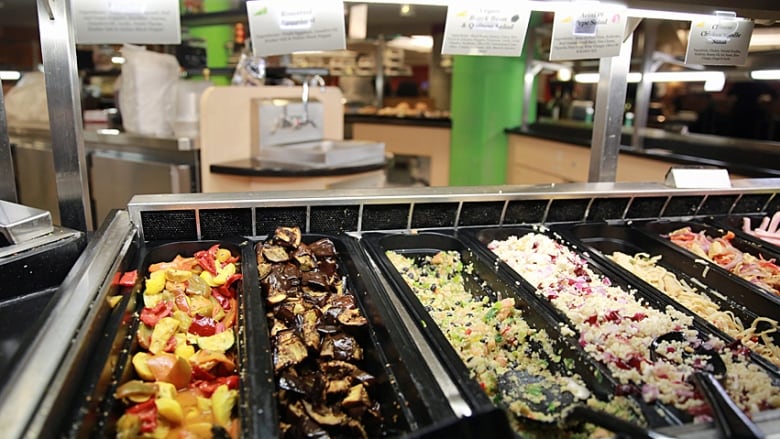Ontario's university students want quality, local food, report finds
'Students have some really strong values around food,' says Merryn Maynard of Meal Exchange

Students at Ontario's universities say they want good quality, local food options when they're eating on campus, a new report says.
The campus food report card from the student advocacy group Meal Exchange found fewer than one in 10 students would recommend food on their campus to a friend. Just a quarter of students felt food on campus helped them maintain a healthy diet.
- Beefing up the menu at MUN, more food options coming to St. John's campus
- Campus food providers under pressure from students to revamp menus
"This report really illuminated that there is a desire from students for things to be better," Merryn Maynard, program co-ordinator at Meal Exchange, said in an interview.
"Students have some really strong values around food. They see the importance of sourcing local food, they see the importance of sustainable choices," she said.
"Food represents the environment and it represents health and justice and students want to be able to support these choices with their actions."
Local is important
There hasn't been a province-wide survey looking at campus food before, and Maynard said they wanted to be sure students' voices were being heard.
The report said 61 per cent of students who responded said food at their school was tasty, while 48 per cent agreed there was a variety of options. Under half 44 per cent said they had fresh food options.
The majority of students said it was important to them that their school source and serve locally grown food (76 per cent) as well as increase the availability of healthy food options (82 per cent).
They ranked the top 10 schools in terms of student satisfaction. The University of Guelph came out on top because of how the school has interacted with students about the food being served.
"They've done a really good job at making sure students know what's happening in the kitchen and engaging them in the process," Maynard said.
'Something we believe in'
Ed Townsley, executive director of hospitality services at Universityof Guelph, said the school is thrilled to be recognized in the report because it comes after a lot of hard work.
In 2008 University of Guelph wanted to focus on where food comes from and he said they buy some food from their own farms and research stations: The school gets honey from its ownapiary in Guelph, it gets fruit from Niagara and maple syrup from Norfolk County.
"It's something we believe in," he said. "We just think that local food tastes better."
He said they educate students through social media, such as unique hashtags students can follow. There's also a student nutrition awareness program that is part of residence life on campus.
"You'll see in a lot of our dining halls and other restaurants on campus, you'll see symbols that are recognizable like Foodland Ontario, Taste Real, things that students may see in other locations that identifies to them what local is," he said.
Veggie Mondays and social media
The plan for the report card, initially, was to rank the schools from best to worst, but Maynard said once they started talking to students and food service groups on the different campuses, they decided "shame and blame" wasn't the way to go.
Instead, she said, they wanted to hold up examples of what other schools could do to offer better choices.
The report card also highlights food services at University of Toronto's St. George campusin particular how the school focuses on local food sources. The food service at the campus takes part in the Greenbelt Fund's Local Food Challenge to raise student awareness about locally-grown food optionsand runs Veggie Mondays, a campus-wide campaign touting the benefits of plant-based foods and offering a discount on vegetarian meals.
Trent University in Peterborough has also placed an emphasis on buying local, including getting chicken, fruit, cheese and dairy from local producers and farmers.
MeanwhileSt. Jerome's University at the University of Waterloo has a map on the wall of its cafeteria that lists the areas and farms where food comes from, and documents making their own in-house sauces, preserves and soups. The school also hasan on-site baker.
Impacts more than campus food
Maynard said now that this report is out, her group hopes it will get people on campuses across the province talking about the current situation and how it can be improved.
"The bottom line is, we want there to be a really strong conversation between campuses that includes the student voice that focuses on what food can do for the university's mission of innovation and student success and health," she said.
And figuring it out on campus may lead to better food options elsewhere.
"Food is complicated, it's complex," Maynard said. "But if we can figure this out collaboratively at a campus level, involving students in that process, then we can figure it out in our cities and our communities and we can figure it out in Canada."












_(720p).jpg)


 OFFICIAL HD MUSIC VIDEO.jpg)
.jpg)



























































































